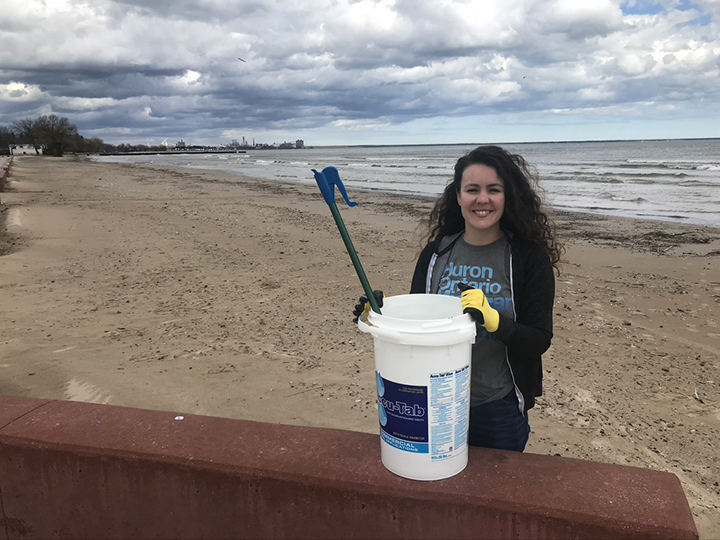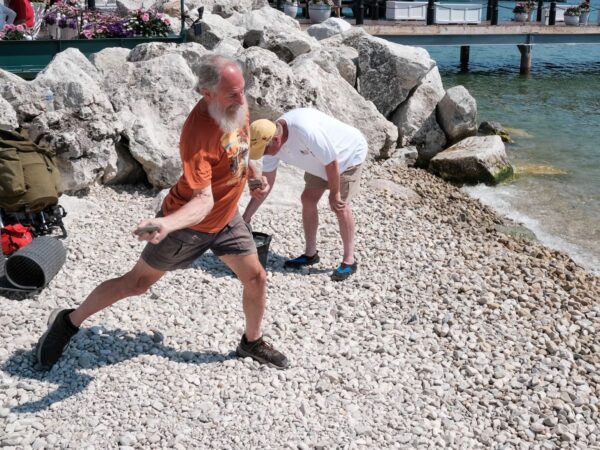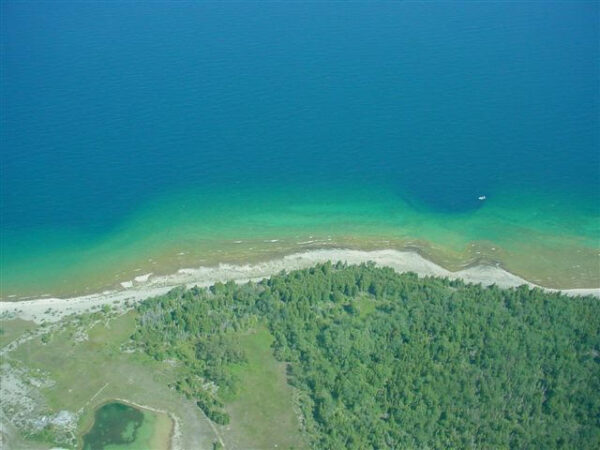
By Darby Hinkley, The Alpena News
This article is part of a collaboration between The Alpena News and Great Lakes Now at Detroit Public Television to bring audiences stories about the Great Lakes, especially Lake Huron and its watershed.
ALPENA — In her experience picking up litter along the Lake Huron shoreline, Meag Schwartz has seen a whole lot of cigarette butts.
In fact, they are the most common form of litter found by all participants in the #GreatLakes1MillionChallenge, a lakeside cleanup effort that aims to remove 1 million pieces of trash from the Great Lakes Basin.
Many other types of trash have been found, as well, including a lot of disposable masks since the coronavirus pandemic began over two years ago. Since November 2020, when the challenge began, 128,897 pieces of trash have been logged on the way to the goal of 1 million.
“That’s a lot more than I could have picked up on my own,” said Schwartz, founder and director of Great Lakes Great Responsibility. “We have an awesome network of volunteers throughout the region.”
She said anyone who lives in the Great Lakes Basin, which includes the entire state of Michigan, can participate in the challenge, either during a scheduled community cleanup or on their own. To participate, count the pieces of litter you pick up as you go, then visit greatlakeslove.org and log the number of pieces of litter so they count toward the total.
“My heart has always been with the Great Lakes,” said Schwartz, who is also the network coordinator for the Northeast Michigan Great Lakes Stewardship Initiative. “I grew up in Alpena, down the street from Lake Huron. I was inspired when I found lots of trash on my own local beach in Ossineke, and I put out a goal for myself, initially, of the million piece challenge, and then I realized it would take me so long if I did it by myself.”
She has recruited a great network of volunteers — mainly through social media — from around the Great Lakes Basin, to help accomplish the lofty goal. She has been encouraged by the enthusiasm and willingness to help keep the Great Lakes clean.
“I have been really inspired by what they’ve been able to accomplish in our first year, of picking up over 100,000 pieces,” Schwartz said of all the volunteers throughout the Great Lakes Basin, which extends to all the U.S. states touching any of the Great Lakes and to Ontario, Canada. Those areas’ direct surface runoff and watersheds form a large drainage basin that feeds into the lakes.
“It’s a lot,” she said of the total number of pieces of litter that has been collected so far. “But really, it’s just a drop in the bucket in terms of what’s actually going into the Great Lakes.”
She said you don’t have to be right on the shoreline to participate and make a difference.
“What happens on land affects what happens in the water, so all these watersheds drain off when we get rain events,” Schwartz explained. “So, if something ends up in a ditch out on a highway, inland, it can end up in our Great Lakes.”
She said plastics are terrible because they can harm wildlife and even end up in our drinking water as microplastics that are barely visible. Ingesting those can cause health problems even beyond what we are aware of at this point in time.
“Recent studies have come out about microplastics in our bloodstream, and deep in our lungs, too, because it’s in the air,” she explained. “And plastics attract other pollutants, too.”
She recommends using a water filter at home for all drinking water to ensure that you are consuming water itself and not microplastics.
“Twenty-two million pounds of plastic is the stat that Rochester Institute of Technology has thrown out there as a model,” Schwartz said of the Great Lakes. “I like to consider us the last line of defense for our Great Lakes, realizing there’s a bigger issue with plastic production, but we’re hoping to prevent marine debris by picking up litter. And that’s all we do is we pick up litter in the Great Lakes region. It’s a simple mission.”
As for cigarette butts, she said that, if you smoke, you could have a water bottle with a little bit of water in the bottom that you keep in your car to put your butts in to keep them from littering the ground and making their way into the waters. Or just keep a plastic baggie in your pocket and hold onto it until you find a trash receptacle.
“It’s a plasticized acetate,” Schwartz said of the filters in cigarette butts. “It is made of a wood product, but it’s processed in a way that essentially turns it into a plastic polymer, and then that can have harmful effects on our wildlife. And stuff bioaccumulates, so the little bugs eat the plastic, the fish eat the bugs, or the fish eat the plastic itself, because they confuse it for food, and then we eat that fish.”
A cleanup was scheduled for this past Saturday in conjunction with Earth Day, but had to be canceled because of thunderstorms, Schwartz said, adding that some people continued to clean up on their own and posted photos on the Great Lakes Great Responsibility Facebook page.
For upcoming community cleanups, check out greatlakeslove.org and the Facebook page for updates.
She added that spring is a great time to clean up wherever you live.
“This is a critical time to be cleaning up litter,” Schwartz said. “It has accumulated over the past several months. The snow melts and it exposes what’s been accumulating over the winter, and it’s before things start growing,” so it’s easier to see the trash before the grass and bushes hide it.
“Our storm drains do directly drain into Lake Huron,” she added, noting that getting out there before the next rain event is
always the best idea, before that trash makes its way out to the water.
Getting children to start the habit of picking up litter is vital to the future of our natural resources, she noted.
“It really is all about education and teaching youth, while they’re young, to be good stewards, because then they’ll take those principles with them into adulthood and make good decisions,” Schwartz said.
Catch more news on Great Lakes Now:
JEWEL OF THE GREAT LAKES: Keeping pollutants out
JEWEL OF THE GREAT LAKES: Group battles invasive species
Featured image: Meag Schwartz, founder and director of Great Lakes Great Responsibility, pauses for a photo while picking up trash at Starlite Beach last week. (Photo Credit: Darby Hinkley/The Alpena News)




